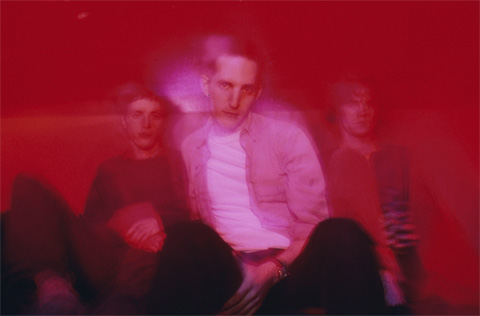
RIGID CORE "Codeine's music could be really intimate and kind of fragile at times, but it also, especially live, had kind of a brutal and fairly confrontational element to it," says Chris Brokaw (right, with John Engle and Stephen Immerwahr). |
Bands named after drugs have a spotty history of making music that fits their substances. Lords of Acid's blaring techno is just right for a savage trip, and Weedeater's roughshod stoner-metal would go well with the right green, but China White and Heroin are too loud and brash to complement a euphoria-inducing drug. It takes about a 10-second listen of a Codeine song to figure out which group they fall into. "We were definitely interested in always trying to depict opiated states, but Codeine's not exactly a feel-good drug," drummer Chris Brokaw says by phone from his home in Seattle. "Part of what it was also trying to depict was a partial state of paralysis and things going by very slowly."
Mission accomplished. The indie-rock band, which started in 1989 and originally called it quits in 1994, prefer plodding tempos and gloomy, bass-heavy notes, building tension like a tornado amassing enough force to eventually level an entire state. The average Codeine song carries enough gravitas and simmering discontent to score the climax of a depressing suburban drama like Donnie Darko or American Beauty. Singer/bassist Stephen Immerwahr's voice — a stoic, talky thing perpetually engrossed in existential conversation with itself — is no ray of sunlight either, but that's fine. At their best, Codeine made good on all the gloom.
Codeine left behind two albums (1990's Frigid Stars and 1994's The White Birch) and the 1992 EP Barely Real — all of which are being given the lavish re-release treatment by the Numero Group. Because of this, the original Codeine lineup (with guitarist John Engle in addition to Immerwahr and Brokaw, who left in 1992 to focus on the Boston-based Come) are teaming up again for a bunch of reunion shows that the drummer insists won't turn into anything more. Although Codeine played their first show in 18 years in Seattle (and Brokaw identifies Codeine as a New York band), they have roots in his former hometown of Boston. Codeine's first show in fact took place at the Middle East upstairs — back when there was only an upstairs — in August '89 on a bill with Bitch Magnet. It wasn't a noteworthy performance, but Brokaw does have strong memories of the several other Boston shows they played: with Autoclave and Beat Happening at T.T. the Bear's Place, a one-time-only cover of Unrest's "Hydroplane" at another T.T.'s show (this recording appears on the Numero releases), and a show opening for My Bloody Valentine and Dinosaur Jr.
Brokaw's only comment on their Middle East debut was that the performance lacked "a lot of the discipline and rigor we ended up bringing to the music," which speaks to Codeine's methodical style. "We really talked a lot about what the role of each instrument was and saying, 'The guitar doesn't necessarily need to be the melodic instrument. The bass drum doesn't necessarily need to be the rhythmic instrument.' It was breaking this music down in a way that I hadn't really done before." The key influence on the act was Joy Division, but Immerwahr also loved Dusty Springfield and the Jesus and Mary Chain, and Brokaw mentions a soft spot for noise-rock band Unsane's 1990 single "Vandal-X." "Codeine's music could be really intimate and kind of fragile at times, but it also, especially live, had kind of a brutal and fairly confrontational element to it."